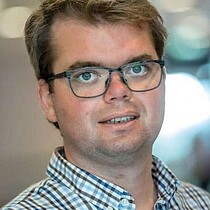

Video: Monday, 10 November 2014
When Dutch railway company Nederlandse Spoorwegen (NS) has to deal with severe disruptions, contingency plans are set in motion manually by the dispatchers of NS and infrastructure manager ProRail who select which trains can still be operated. It’s a process that takes time. But it could be done much faster, according to new research by PhD candidate Luuk Veelenturf of Rotterdam School of Management, Erasmus University (RSM) in cooperation with NS. The manual process could be replaced by simply letting a mathematical algorithm create an optimal timetable within seconds.
Railway operators and infrastructure managers put a lot of effort into preventing disruptions in the first place, but it’s impossible to avoid extreme weather conditions and other problems on the tracks. In Veelenturf’s thesis Disruption Management in Passenger Railways, Models for Timetable, Rolling Stock and Crew Rescheduling he presents tools which can help railway operators in their decision-making during disruptions, based on testing with real NS data. These tools can evaluate millions of permutations for dealing with the disruption in a very short time, a task that would be very time-consuming for the railway operators to do manually.
Tracks taken out of service due to a disruption is a frequently occurring problem in railway operations. Veelenturf’s tool indicates which trains should be cancelled or delayed so that as many trains as possible can still run. It can also be a real challenge to timetable the remaining trains through the stations close to the disruption, especially in stations that receive a lot of train traffic. Veelenturf’s tool can very quickly produce a new timetable that enables the maximum number of trains to run on the limited tracks available.
Tools using mathematical models for rolling stock and crew rescheduling, are already in use by NS. However, Veelenturf believes it’s possible to improve these existing approaches using his research, which indicates that sophisticated tools could help railway operators to make even better decisions during disruptions. Small adaptations to the models behind these tools reduce the number of trains cancelled during disruptions - good news for passengers.
The models aim to reduce the inconvenience passengers face during disruptions in comparison with current models in scientific literature, and have been tested on particular scenarios in which they have proved to work very well. Veelenturf’s tools are currently at the prototype stage and now require investment from railway operators in order to show their true potential.
By using Veelenturf’s research, railway operators stand to profit from more robust railway systems in which disruptions have less impact, and a more robust railway system is more attractive to passengers, and becomes more competitive to travelling by car.
Every day a significant number of people choose railways as a comfortable and sustainable way of transportation. In order to accommodate the journeys of a large number of railway passengers, extensive planning is necessary. Unfortunately, the execution of the plans is frequently disrupted by unexpected events. For railway operators it is quite a challenge to deal with these disruptions as even small deviations from the plan can have large influences on the timetable, the rolling stock schedule and the crew schedule. More severely, these events reduce the available transport capacity and interrupt the mobility of the passengers.
This thesis discusses several models and solution approaches for the management of railway disruption based on algorithmic techniques from Operations Research. The main focus is to reduce the inconvenience passengers experience during disruptions. This is achieved by improving the approaches to disruption management for timetables, rolling stock and crew rescheduling proposed within the scientific community. The existing models are extended by introducing greater flexibility, e.g. allowing small delays in the crew rescheduling or additional stops in the rolling stock rescheduling. As a result fewer trains are cancelled during disruptions and passengers have more options to reach their destination. Although some inconvenience will remain, as much as possible is mitigated.

Veelenturf has defended his dissertation in the Senaatszaal at Erasmus University Rotterdam on Friday, 21 November 2014. His promoter is Leo Kroon, Professor of Quantitative Logistics at RSM and his co-promotor is Dr. Gábor Maróti (VU University Amsterdam). Other members of the Doctoral Committee are Prof. Paolo Toth (University of Bologna), dr. Rob Zuidwijk (RSM), dr. Dennis Huisman (Erasmus School of Economics).


Science Communication and Media Officer
Rotterdam School of Management, Erasmus University (RSM) is one of Europe’s top-ranked business schools. RSM provides ground-breaking research and education furthering excellence in all aspects of management and is based in the international port city of Rotterdam – a vital nexus of business, logistics and trade. RSM’s primary focus is on developing business leaders with international careers who can become a force for positive change by carrying their innovative mindset into a sustainable future. Our first-class range of bachelor, master, MBA, PhD and executive programmes encourage them to become to become critical, creative, caring and collaborative thinkers and doers.
